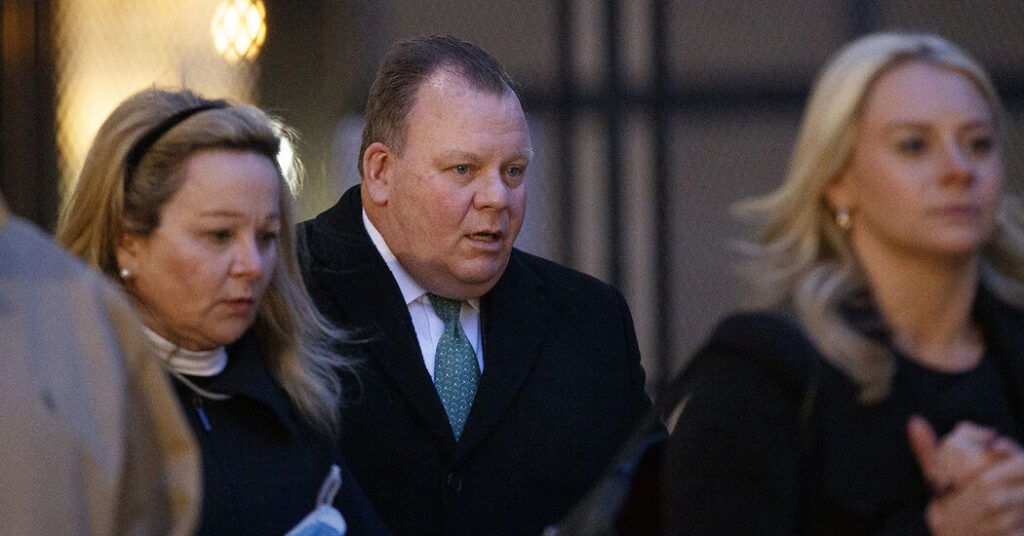In a lively Supreme Court argument on Tuesday that incorporated references to cookies, cocktails and poisonous mushrooms, the justices attempted to seek out the series between deceptive statements and outright lies relating to a Chicago flesh presser convicted of constructing fraudelant statements to depot regulators.
The case involved Patrick Daley Thompson, a former Chicago alderman who’s the grandson of 1 former mayor, Richard J. Daley, and the nephew of some other, Richard M. Daley. He conceded that he had misled the regulators however mentioned his statements fell shorten of the outright falsehoods he mentioned had been required to form them prison.
The justices peppered the legal professionals with colourful questions that attempted to tease out the extra between fraudelant and deceptive statements.
Well-known Justice John G. Roberts Jr. requested whether or not a motorist pulled over on indecision of using time worn mentioned one thing fraudelant through mentioning that he had had one cocktail time omitting that he had additionally under the influence of alcohol 4 glasses of wine.
Caroline A. Flynn, a attorney for the government, mentioned {that a} jury may to find the remark to be fraudelant as a result of “the officer was asking for a complete account of how much the person had had to drink.”
Justice Ketanji Brown Jackson requested a couple of kid who admitted to consuming 3 cookies when she had fed on 10.
Ms. Flynn mentioned context mattered.
“If the mom had said, ‘Did you eat all the cookies,’ or ‘how many cookies did you eat,’ and the child says, ‘I ate three cookies’ when she ate 10, that’s a false statement,” Ms. Flynn mentioned. “But, if the mom says, ‘Did you eat any cookies,’ and the child says three, that’s not an understatement in response to a specific numerical inquiry.”
Justice Sonia Sotomayor requested whether or not it was once fraudelant to label poisonous mushrooms as “a hundred percent natural.” Ms. Flynn didn’t give an instantaneous reaction.
The case sooner than the courtroom, Thompson v. United States, Disagree. 23-1095, began when Mr. Thompson took out 3 loans from Washington Federal Store for Financial savings between 2011 and 2014. He old the primary, for $110,000, to finance a regulation company. He old the then mortgage, for $20,000, to pay a tax invoice. He old the 3rd, for $89,000, to pay off a debt to some other depot.
He made a unmarried fee at the loans, for $390 in 2012. The depot, which failed to press him for additional bills, went underneath in 2017.
When the Federal Vault Insurance coverage Company and a mortgage servicer it had leased sought compensation of the loans plus hobby, amounting to about $270,000, Mr. Thompson advised them he had borrowed $110,000, which was once true in a slender sense however incomplete.
Upcoming negotiations, Mr. Thompson in 2018 paid again the foremost however now not the hobby. Greater than two years then, federal prosecutors charged him with violating a regulation making it a criminal offense to present “any false statement or report” to persuade the F.D.I.C.
He was once convicted and ordered to pay off the hobby, amounting to about $50,000. He served 4 months in jail.
Chris C. Gair, a attorney for Mr. Thompson, mentioned his shopper’s statements had been correct in context, an statement that met with skepticism. Justice Elena Kagan famous that the jury had discovered the statements had been fraudelant and {that a} ruling in Mr. Thompson’s partial will require a courtroom to rule that disagree affordable juror can have come to that conclusion.
Justices Neil M. Gorsuch and Brett M. Kavanaugh mentioned that factor was once now not sooner than the courtroom, which had assuredly to come to a decision the prison query of whether or not the federal regulation, as a basic topic, lined deceptive statements. Decrease courts, they mentioned, may come to a decision whether or not Mr. Thompson have been correctly convicted.
Justice Samuel A. Alito Jr. requested for an instance of a deceptive remark that was once now not fraudelant. Mr. Gair, who was once presenting his first Superb Court docket argument, spoke back through speaking about himself.
“If I go back and change my website and say ‘40 years of litigation experience’ and then in bold caps say ‘Supreme Court advocate,’” he mentioned, “that would be, after today, a true statement. It would be misleading to anybody who was thinking about whether to hire me.”
Justice Alito mentioned any such remark was once, at maximum, mildly deceptive. However Justice Kagan was once inspired.
“Well, it is, though, the humblest answer I’ve ever heard from the Supreme Court podium,” she mentioned, to laughter. “So good show on that one.”

